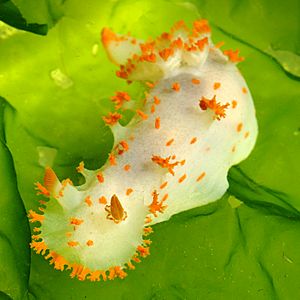Sea clown triopha facts for kids
Quick facts for kids Sea clown triopha |
|
|---|---|
 |
|
| Scientific classification | |
| Kingdom: | |
| Phylum: | |
| Class: | |
| (unranked): |
clade Heterobranchia
clade Euthyneura clade Nudipleura clade Nudibranchia clade Euctenidiacea clade Doridacea |
| Superfamily: |
Polyceroidea
|
| Family: | |
| Subfamily: | |
| Genus: |
Triopha
|
| Species: |
T. catalinae
|
| Binomial name | |
| Triopha catalinae (Cooper, 1863)
|
|
The Triopha catalinae, often called the sea clown triopha or just sea clown, is a very colorful type of sea slug. It belongs to a group of animals known as nudibranchs. These amazing creatures are mollusks that live in the ocean. Unlike many other mollusks, sea clowns do not have a shell. They are part of the Polyceridae family.
The scientific name, Triopha catalinae, comes from Santa Catalina Island in California. This is one of the places where this sea slug was first found.
Where Does the Sea Clown Live?
This interesting sea slug lives in the eastern part of the Pacific Ocean. You can find it along the coast from Alaska all the way down to Mexico. Scientists have also found the sea clown in places like Japan and South Korea. This shows they can travel quite far!
What Does the Sea Clown Eat?
The sea clown triopha is a type of animal that "grazes." This means it slowly eats tiny living things that grow on surfaces underwater. Its main food source is small, moss-like animals called bryozoans. It uses a special mouth part, like a tiny grater, to scrape these bryozoans off rocks and other surfaces.
Images for kids
-
Triopha catalinae on red coralline algae in a tide pool in Central California



